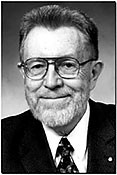Family members of a recently deceased UA professor are collecting money with hopes of establishing an undergraduate endowment program in his honor.
Michael Wells, a former UA biochemistry and molecular biophysics researcher and professor, died May 23 after a “”well fought”” battle with leukemia at the age of 67, according to a press release.
His dedication to research and his confidence in the abilities of undergraduate students made him a pivotal part of the biochemistry research department – something his family wants to continue supporting even after his death, according to his obituary.
Wells had a huge part in the creation of the Undergraduate Biology Research Program, a program meant to enable students to experience research firsthand.
Carol Bender, molecular and cellular biology program director, worked with Wells on creating the UBRP.
“”He had a wonderful, inclusive vision for exciting students about science,”” Bender wrote in an e-mail. “”In starting the program, Dr. Wells created a culture on our campus that values undergraduate research.””
James Pennington, who worked in the lab with Wells since 1996, said Wells believed younger students, even high school students, would benefit by working in a lab early on – something most research departments don’t promote.
“”Having students in a lab was considered a novel thing and was unusual unless (the students) were juniors or seniors (in college),”” said Pennington, an assistant research scientist. “”(Wells) was one of the innovators of trying to turn that idea around in terms of getting students in the lab.””
Pennington said some of the most successful students are a part of UBRP and Wells believed that even undergraduate students are capable of doing great things.
Kelsey Thorson, a biochemistry and physics junior, worked under the supervision of Wells in the UBRP laboratory for the past two years.
“”He thought I was doing so well he let me do (my research) on my own,”” Thorson said. “”He was a mentor, an advisor and a boss at the same time – but mostly a mentor.””
Wells’ dedication to biochemical research kept him working in the lab almost fulltime even after he retired almost two years ago, said Michael Cusanovich, a regents professor of biochemistry.
“”(Wells) was a major player in the growth of this university and he was a great leader,”” Cusanovich said. “”This is a terrible loss.””
After his retirement, Wells became a large part of the Manduca Project, a science outreach program for elementary school students, said Mary Hernandez, a research technician.
Wells loved butterflies and insects and enjoyed telling children about them. He would also work closely with teachers to organize hands-on experiments and he sometimes brought guest speakers to talk to the children about insects, Hernandez said.
“”He was an awesome and a wonderful man and he was always working to improve the (Manduca Project),”” Hernandez said. “”He made it so much fun and he loved his job.””
Wells requested that there be no memorial service after his death, but there will be a reunion in the fall for all family, friends, students and colleagues to honor his accomplishments and celebrate his life.
Wells is survived by his wife, three children and 12 grandchildren.









